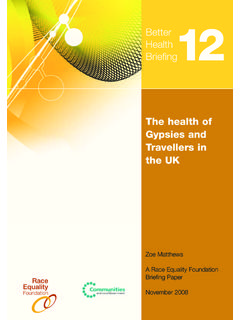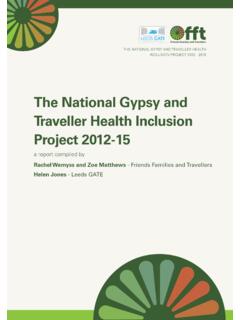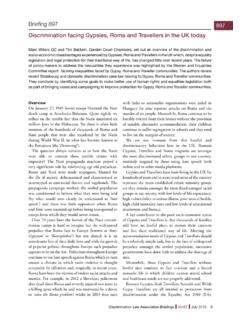Transcription of THE LAW RELATING TO GYPSIES AND TRAVELLERS
1 THE LAW RELATING TO GYPSIES AND TRAVELLERSC hris Johnson, Angus Murdoch and Marc and Travellers2 first arrived in England and Wales in or about 1500. Over the centuries they have been subjected to much prejudice and discrimination. However, by the beginning of the twentieth century, while remaining effectively excluded from education and proper health care, they had at least arrived at a position where they were able to find places to stop for reasonable periods of time. For example, they were allowed to stop on the enormous areas of common land across the two countries. In one of the leading cases concerning the eviction of GYPSIES and TRAVELLERS ,3 Sedley J. (as he then was) gave a useful potted history of the last century as it related to GYPSIES and TRAVELLERS : For centuries the commons of England provided lawful stopping places for people whose way of life was or had become nomadic.
2 Enough common land survived the centuries of enclosure to make this way of life sustainable, but by section 23 of the Caravan Sites and Control of Development Act 1960 local authorities were given power to close the commons to TRAVELLERS . This they proceeded to do with great energy, but made no use of the concomitant power given to them by section 24 of the same Act to open caravan sites to compensate for the closure of the commons. By the Caravan Sites Act 1968, therefore, Parliament legislated to make the section 24 power a the next quarter of a century there followed a history of non-compliance with the duties imposed by the Act of 1968, marked by a series of decisions of this court holding local authorities to be in breach of their statutory duty; but to apparently little practical effect.
3 The default powers vested in central government, to which the court was required to defer, were rarely if ever used. This Chapter begins by examining the most extreme situation faced by some GYPSIES and TRAVELLERS today, eviction from unauthorised encampments. Some 20% or more of GYPSIES and Travellers4 remain on unauthorised roadside encampments due to the continuing (and increasing) lack of stopping places and sites and due to the failure of the planning laws in many cases to provide a realistic method for GYPSIES and TRAVELLERS (where they can afford to do so) to set up their own sites. We then move on to the related 1 Chris Johnson and Angus Murdoch are practising solicitors and members of the TRAVELLERS Advice Team based at Community Law Partnership solicitors in Birmingham.
4 Marc Willers is a barrister practising in Chambers at 1 Pump Court in London. The conclusion was written by Andrew Ryder of the TRAVELLERS Law Reform Coalition. 2As we go through the chapter we will discuss the legal definition of Gypsy where it is relevant. 3R v Lincolnshire CC ex p Atkinson, Wealden DC ex p Wales & Stratford (1996) 8 Admin LR 529, The Times September 22nd 1995. 4 According to the Office of the Deputy Prime Minister s Gypsy Count. subject of homelessness and to discuss the situation with regard to GYPSIES and TRAVELLERS on official caravan the then Conservative Government, introduced the Criminal Justice and Public Order Act 1994 ( the 1994 Act - which repealed the duty on local authorities to provide sites) it stated that future provision should be made by GYPSIES and TRAVELLERS setting up their own sites.
5 In this Chapter we will also discuss the difficulties faced by GYPSIES and TRAVELLERS trying to obtain planning permission and the planning powers of local authorities. We conclude the Chapter with a discussion of racial discrimination, education and health law as they apply to GYPSIES and TRAVELLERS . 2. Evictions from Unauthorised EncampmentsSince the introduction of the 1994 Act and the removal of the duty to provide sites, the role of government guidance has come to the fore when advising GYPSIES and TRAVELLERS on the law RELATING to evictions from unauthorised encampments. Under sections 77-80 of the 1994 Act, local authorities may direct persons who are unlawfully residing in vehicles on land in their own area to leave. These powers extend to privately owned land. It is an offence to fail to comply with such a direction or to return within 3 months.
6 A magistrates court can make a removal order authorising the local authority to enter the land and remove the persons and vehicles. Section 77 provides: (1) If it appears to a local authority that persons are for the time being residing in a vehicle or vehicles within that authority s area - (a) on any land forming part of a highway; (b) on any other unoccupied land; or (c) on any occupied land without the consent of the occupier, the authority may give a direction that those persons and any others with them are to leave the land and remove the vehicle or vehicles and any other property they have with them on the land. Section 61 of the 1994 Act provides a potentially even more draconian power for the police to remove GYPSIES and TRAVELLERS where the landowner or occupier has taken reasonable steps and where one of three criteria are satisfied.
7 Failure to obey such a direction or returning to the land in question within three months is not only an offence but can result in arrest and impoundment of vehicles ( the GYPSIES and TRAVELLERS homes), even before a magistrates court order has been obtained. Section 61 provides: (1) If the senior police officer present at the scene reasonably believes that two or more persons are trespassing on land and are present there with the common purpose of residing there for any period, that reasonable steps have been taken by or on behalf of the occupier to ask them to leave and - (a) that any of those persons has caused damage to the land or to property on the land or used threatening, abusive or insulting words or behaviour towards the occupier, a member of his family or an employee or agent of his, or (b) that those persons have between them six or more vehicles on the land, he may direct those persons, or any of them, to leave the land and to remove any vehicles or other property they have with them on the land.
8 Department of the Environment (DoE) Circular 18 with such severe provisions (as well as other methods of eviction further discussed below), it is essential that GYPSIES and TRAVELLERS advisers try to ensure that government guidance is followed. In the Atkinson case,5 the judge made it clear that local authorities ought to comply with the guidance in Circular 18/946 before deciding whether or not to evict GYPSIES and TRAVELLERS from an unauthorised site. The Circular makes it clear that, whilst it is a matter for local discretion to decide whether it is appropriate to evict an encampment, the Secretary of State believes that local authorities should consider using their powers to do so wherever GYPSIES and TRAVELLERS are causing a level of nuisance which cannot be effectively controlled. The Circular also makes it plain that it would usually be legitimate for a local authority to exercise its powers whenever GYPSIES and TRAVELLERS who are camped unlawfully refuse to move onto an authorised local authority site where there are vacancies.
9 However, where there are no such sites and the authority reaches the view that an unauthorised encampment is not causing a level of nuisance which cannot be effectively controlled, the Circular states that the authority should consider providing basic services, such as toilets, a refuse skip and a supply of drinking Circular then goes on to outline how local authorities should exercise their powers, making it clear that they should be used in a humane and compassionate way, taking account of the rights and needs of the GYPSIES and TRAVELLERS concerned, the owners of the land in question and the wider community whose lives may be affected by the Local authorities are reminded of their obligations under Part III of the Children Act 1989 (regarding the welfare of children in need ), Part III of the Housing Act 1985 (now Part VII of the Housing Act 1996, regarding duties to homeless people)
10 And also their responsibilities regarding the provision of education for school-age It also states that local authorities should bear in mind possible assistance from local health and/or welfare order to ensure a balanced decision is taken by a local authority that is contemplating the eviction of GYPSIES or TRAVELLERS from an unauthorised encampment, the local 5 See footnote 2. 6 In fact the DoE no longer exists and responsibility for traveller and Gypsy matters lays with the Office of the Deputy Prime Minister. The equivalent in Wales is the identical Welsh Office Circular 76/94. 7 DoE Circular 18/94, para. 6. 8 Ibid, para. 9. 9 Ibid, paras. 10 & 11. 10 Ibid, para. 13. authority should have in place some form of enquiry process and some method of evaluating and considering the relative merits of the information gleaned.








